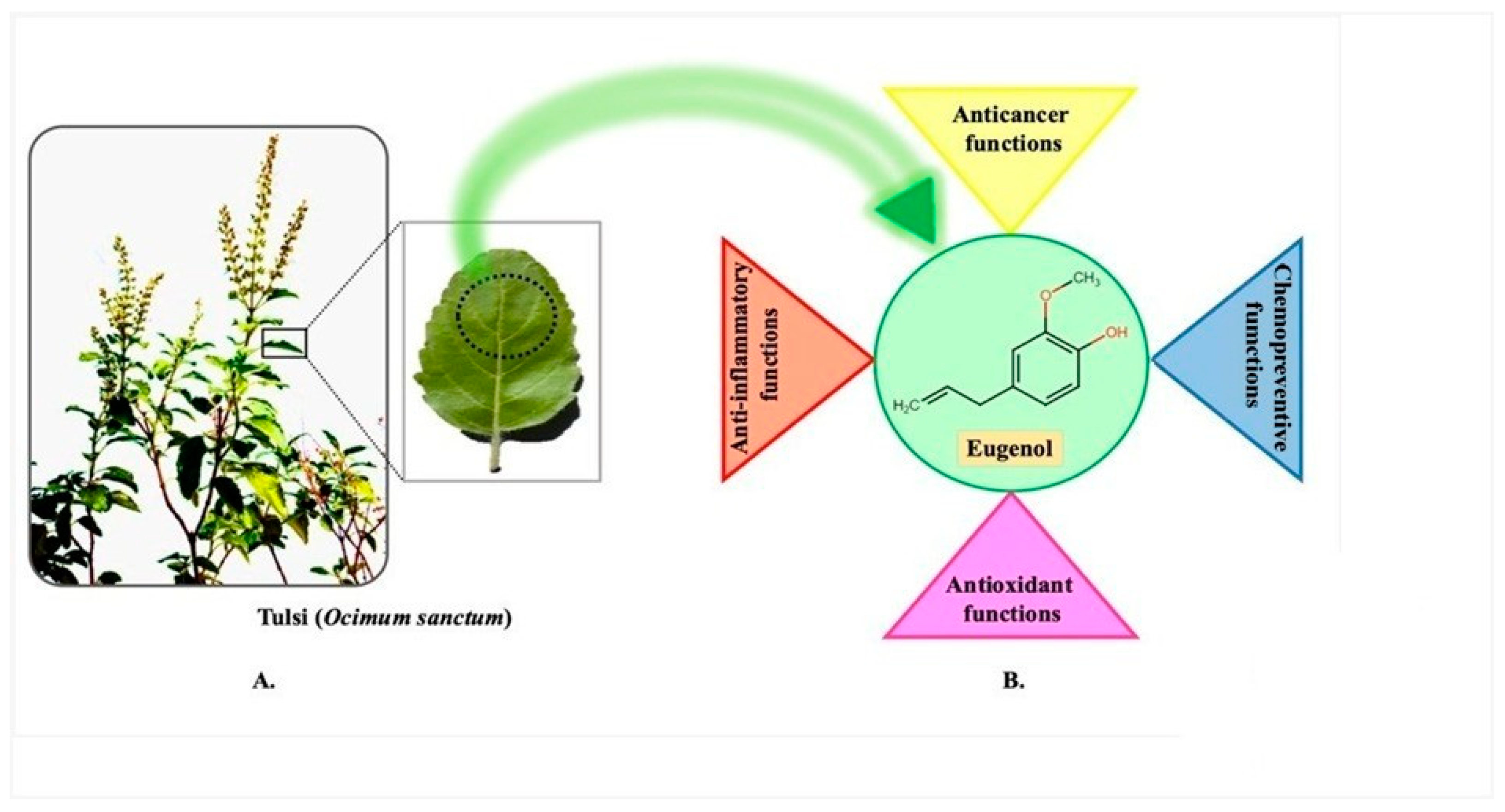Tulsi’s Healing Compounds: Phenols, Flavonoids, and Their Benefits
Tulsi (Ocimum sanctum), also known as Holy Basil, is a revered herb in traditional Ayurvedic medicine. It has been used for centuries due to its therapeutic properties and spiritual significance. Among the many bioactive compounds present in Tulsi, phenols and flavonoids are two primary groups that contribute significantly to its medicinal benefits.
Chemical Composition: Phenols and Flavonoids
1. Phenols in Tulsi:
Phenolic compounds represent a diverse class of secondary metabolites that are ubiquitously found throughout the plant kingdom. These compounds are characterized by a hydroxyl group (-OH) attached to an aromatic ring. In Tulsi, phenols contribute to its antioxidant, antimicrobial, and anti-inflammatory properties.
Some prominent phenolic compounds in Tulsi include:
- Eugenol: The primary phenolic compound in Tulsi, eugenol possesses significant analgesic, anti-inflammatory, and antimicrobial effects. It is often responsible for the plant’s characteristic aroma and taste.
- Rosmarinic Acid: A potent antioxidant and anti-inflammatory agent, rosmarinic acid helps in fighting oxidative stress and reducing inflammation.
- Caffeic Acid: Known for its antioxidant properties, caffeic acid can help reduce cellular damage and prevent chronic diseases associated with oxidative stress.
Health Benefits of Phenols in Tulsi:
- Antioxidant Activity: Phenolic compounds like eugenol and rosmarinic acid neutralize harmful free radicals in the body, protecting cells from oxidative damage. This can reduce the risk of chronic conditions like cancer, cardiovascular diseases, and neurodegenerative diseases.
- Anti-inflammatory Effects: The anti-inflammatory properties of phenols help alleviate symptoms in conditions like arthritis, asthma, and other inflammatory disorders.
- Antimicrobial and Antiviral: Eugenol, a powerful antimicrobial agent, helps in inhibiting the growth of bacteria and fungi, providing protection against infections. Tulsi is often used as a remedy for respiratory infections like cough, cold, and bronchitis.
- Stress Reduction: The adaptogenic properties of phenols help in managing stress, by balancing cortisol levels and supporting the body’s ability to adapt to stressors.
2. Flavonoids in Tulsi:
Flavonoids are a group of plant metabolites known for their diverse biological activities. They are polyphenolic compounds that include flavones, flavonols, and flavanols, which are essential for the plant’s antioxidant and anti-inflammatory properties.
Key flavonoids found in Tulsi include:
- Kaempferol: A potent flavonoid known for its anti-inflammatory, antioxidant, and anti-cancer properties. Kaempferol supports immune health and reduces the risk of chronic diseases.
- Luteolin: This flavonoid is associated with anti-inflammatory, neuroprotective, and antioxidant properties. It also has the potential to improve heart health.
- Quercetin: A well-known antioxidant that helps protect against oxidative stress and enhances immune function. Quercetin can also aid in reducing blood pressure and controlling blood sugar levels.
Health Benefits of Flavonoids in Tulsi:
- Cardiovascular Health: Flavonoids like kaempferol and quercetin have been shown to improve heart health by reducing blood pressure, lowering LDL cholesterol levels, and improving blood circulation.
- Anti-cancer Properties: Several studies suggest that flavonoids in Tulsi, particularly kaempferol and luteolin, may have potential anticancer effects by inhibiting the growth of cancer cells and preventing tumor formation.
- Anti-inflammatory Effects: Like phenols, flavonoids also exhibit powerful anti-inflammatory properties, helping to alleviate symptoms of chronic inflammation associated with conditions like arthritis, allergies, and autoimmune diseases.
- Neuroprotective Effects: The flavonoids in Tulsi, especially luteolin, can have beneficial effects on brain health. They are believed to reduce cognitive decline, protect against neurodegenerative diseases, and support overall brain function.
- Improved Immune Function: Flavonoids in Tulsi help modulate the immune response, enhancing the body’s defense against infections and diseases.
Overall Health Benefits of Tulsi:
In addition to phenols and flavonoids, Tulsi contains various other bioactive compounds like essential oils (e.g., eugenol), vitamins (like Vitamin C), minerals, and alkaloids that contribute to its diverse health benefits. Some of the overall health advantages of Tulsi include:
- Adaptogenic Effects: Tulsi is considered an adaptogen, helping the body to cope with stress and promoting balance in bodily functions. It reduces the levels of cortisol, the stress hormone, and enhances mental clarity and calmness.
- Blood Sugar Regulation: Tulsi has been shown to help in managing blood sugar levels, making it beneficial for people with type 2 diabetes. The flavonoids and phenolic compounds help improve insulin sensitivity and reduce blood sugar spikes.
- Respiratory Health: Tulsi is a natural remedy for respiratory problems such as asthma, bronchitis, and cough. Its antimicrobial, anti-inflammatory, and expectorant properties help in clearing mucus from the respiratory system, easing breathing, and reducing inflammation.
- Detoxification and Liver Health: Tulsi aids in detoxifying the body by promoting liver function and eliminating harmful toxins. It can support healthy digestion, reduce bloating, and prevent liver damage.
- Anti-aging and Skin Health: The antioxidants in Tulsi, particularly phenolic compounds, protect the skin from damage caused by UV rays, pollution, and environmental stressors. Regular consumption of Tulsi can help in delaying the appearance of wrinkles, acne, and other skin issues.
- Boosts Immunity: Tulsi strengthens the immune system due to its antimicrobial, antiviral, and antibacterial properties. It can help prevent infections, enhance the body’s defense mechanisms, and speed up recovery from illness.
- Digestive Health: Tulsi aids in digestion by promoting the secretion of gastric juices, enzymes, and bile. It can alleviate indigestion, gas, bloating, and constipation.
- Mental Clarity and Cognitive Function: Tulsi’s adaptogenic properties, along with its flavonoids, enhance cognitive function and memory. Regular consumption can reduce anxiety, improve focus, and support overall mental well-being.
Final Note:
Tulsi is a powerhouse of beneficial compounds, including phenols and flavonoids, which offer a wide range of health benefits. From improving immune function and managing stress to supporting cardiovascular and brain health, Tulsi is truly a holistic herb with therapeutic properties that enhance overall wellness. Whether consumed as a tea, in supplement form, or incorporated into daily cooking, Tulsi can be an invaluable addition to your health regimen.
Brrr… Why Ulaanbaatar Is More Than Just the Coldest Capital | Maya




